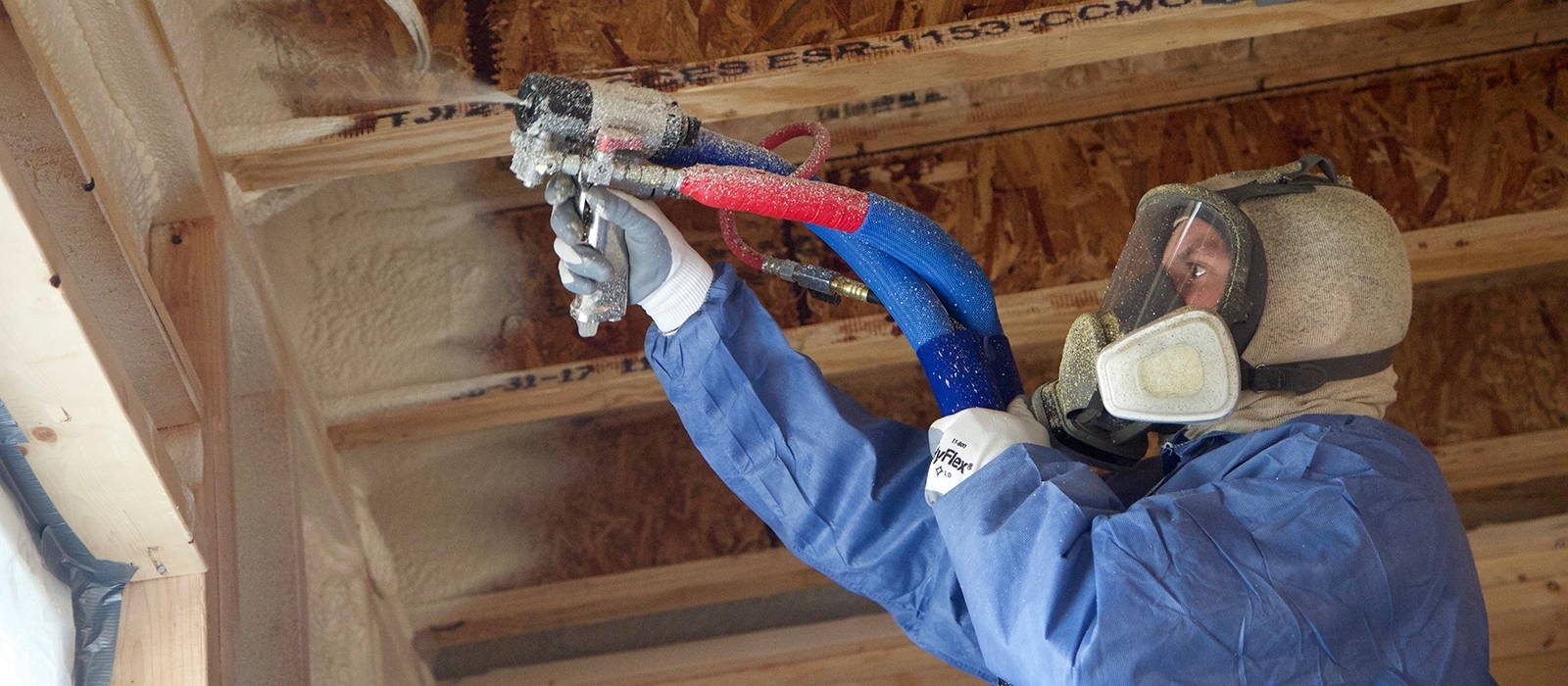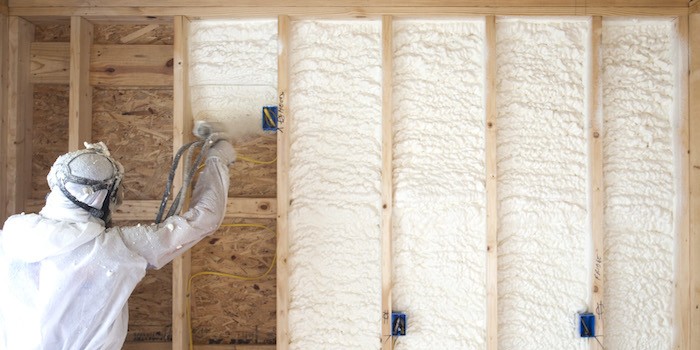Picking the Right Type of Spray Foam for Your Insulation Requirements
Picking the Right Type of Spray Foam for Your Insulation Requirements
Blog Article
Spray Foam: The Ultimate Solution for Air Sealing and Insulation
Spray foam insulation has emerged as a leading service for reliable air sealing and thermal insulation, offering an one-of-a-kind combination of residential properties that establish it aside from typical methods. Its ability to expand and fill spaces makes it particularly efficient in protecting against air leak, which can dramatically impact power effectiveness. Comprehending the full range of its advantages, installment procedures, and comparisons with other insulation types is crucial for making educated decisions. As we check out these facets, the implications for both brand-new buildings and retrofits become progressively substantial. What factors should influence your choice?
What Is Spray Foam?
Spray foam is a functional insulation material that combines the concepts of air sealing and thermal resistance to improve power effectiveness in structures. Composed largely of polyurethane or various other comparable compounds, spray foam is used as a fluid that expands upon call with surfaces, producing a strong, continual layer of insulation. This distinct building enables it to load gaps, fractures, and gaps that traditional insulation materials might neglect, supplying a superior air seal.
There are two primary kinds of spray foam: open-cell and closed-cell. Open-cell spray foam is lighter and much more adaptable, providing exceptional audio absorption and a reduced R-value per inch - Spray Foam. On the other hand, closed-cell spray foam is denser, offering a higher R-value, dampness resistance, and added architectural honesty to constructing elements
The application procedure normally involves specific devices, making sure a smooth application that complies with numerous substratums, consisting of metal, concrete, and wood. This flexibility makes spray foam ideal for both brand-new building and constructions and retrofitting existing frameworks. Its capability to produce a closed barrier substantially adds to minimizing energy usage and enhancing indoor air high quality, thus making it a preferred choice amongst home builders and house owners alike.
Benefits of Spray Foam Insulation
One of one of the most substantial benefits of spray foam insulation is its exceptional capacity to produce a continuous air obstacle, which successfully decreases power loss. Unlike conventional insulation materials, spray foam increases to fill up gaps and cracks, guaranteeing that air leak is substantially minimized. This characteristic not just boosts power efficiency yet likewise brings about reduce energy expenses over time.
Furthermore, spray foam insulation offers premium thermal resistance, adding to an extra stable interior environment. Its high R-value per inch enables reliable insulation in constrained spaces, making it excellent for attics, wall surfaces, and crawl rooms. The moisture-resistant homes of spray foam aid avoid mold and mildew growth, promoting much healthier living problems.
Another important advantage of spray foam insulation is its sound-dampening qualities (Spray Foam). It properly reduces noise transmission between spaces, producing a quieter and extra comfortable home atmosphere. The durability of spray foam also stands apart, as it does not sag or work out gradually, keeping its performance throughout its lifespan
How Spray Foam Works
Understanding how spray foam insulation works is vital for valuing its efficiency in air sealing and thermal resistance. Spray foam insulation includes two primary components: isocyanate and polyol resin. When these components are mixed, they undertake a chain reaction that creates the product to broaden quickly, producing a dense foam that fills cavities, voids, and splits.
As the foam blog here expands, it complies with surface areas, developing an airtight seal that substantially minimizes air infiltration. This particular makes spray foam insulation extremely effective at stopping drafts and moisture penetration, which can cause power loss and damages in time. Additionally, the closed-cell variation of spray foam provides superior thermal resistance because of its inflexible framework, properly decreasing heat transfer.
The distinct homes of spray foam enable it to comply with uneven surfaces, ensuring comprehensive protection and a smooth barrier. Because of this, spray foam insulation not just boosts power performance however likewise adds to improved click indoor air quality by minimizing the buildup of toxins and irritants. Eventually, comprehending the mechanics behind spray foam emphasizes its role as an exceptional selection for insulation and air sealing in both business and property applications.
Installation Process Introduction

Before installation, the space must be appropriately cleansed and prepped, making sure that surfaces are without dampness, debris, and dust. This step is vital due to the fact that pollutants can endanger adhesion and overall efficiency. When the area is prepared, the application entails blending the 2 elements of the spray foam, which increases upon get in touch with and loads voids efficiently.
Trained specialists ought to conduct the setup, using specialized devices to make sure consistent protection and optimum density. Safety preventative measures, including putting on safety gear and guaranteeing appropriate ventilation, are imperative throughout this process. After application, the foam generally treatments swiftly, developing a solid obstacle that enhances energy efficiency.
Comparing Spray Foam to Conventional Insulation
When examining insulation options, spray foam insulation attracts attention in contrast to typical products such as fiberglass and cellulose. Among the key benefits of spray foam is its premium air sealing capabilities. Unlike fiberglass and cellulose, which can enable air seepage, spray foam increases upon application, filling up gaps and holes to develop an impermeable seal. This results in enhanced energy performance, as less warmed or cooled air escapes the home, resulting in reduced utility bills.
Additionally, spray foam gives a greater R-value per inch than conventional insulation kinds, using more reliable thermal resistance in a thinner account. This characteristic is specifically beneficial precede with minimal cavity depth. Furthermore, spray foam is immune to dampness and mold development, which can be a substantial interest in cellulose and fiberglass, specifically in moist settings.
Nevertheless, spray foam insulation generally brings a higher upfront cost than its conventional counterparts. Homeowners must evaluate this first investment against long-lasting power cost savings and efficiency advantages. Inevitably, while both insulation types serve their purpose, spray foam becomes a much more innovative solution for modern insulation requirements, especially in regards to air review securing and thermal performance.

Verdict
In recap, spray foam insulation represents a highly reliable remedy for attaining optimum air securing and thermal resistance. Its special buildings, consisting of wetness resistance and sound dampening, make it suitable for numerous applications in both brand-new buildings and retrofitting jobs (Spray Foam). Although the preliminary costs might be greater compared to typical insulation materials, the long-lasting benefits, such as significant power financial savings and enhanced indoor air top quality, warrant the investment and underscore its worth in modern-day building practices.
Spray foam insulation has arised as a leading service for reliable air sealing and thermal insulation, offering a special mix of properties that set it apart from typical methods.Spray foam is a flexible insulation product that incorporates the principles of air securing and thermal resistance to improve power performance in buildings.When evaluating insulation choices, spray foam insulation stands out in contrast to conventional products such as fiberglass and cellulose. Inevitably, while both insulation types offer their objective, spray foam emerges as a much more advanced option for modern-day insulation needs, especially in terms of air securing and thermal performance.
In summary, spray foam insulation stands for a very effective option for attaining optimal air sealing and thermal resistance.
Report this page